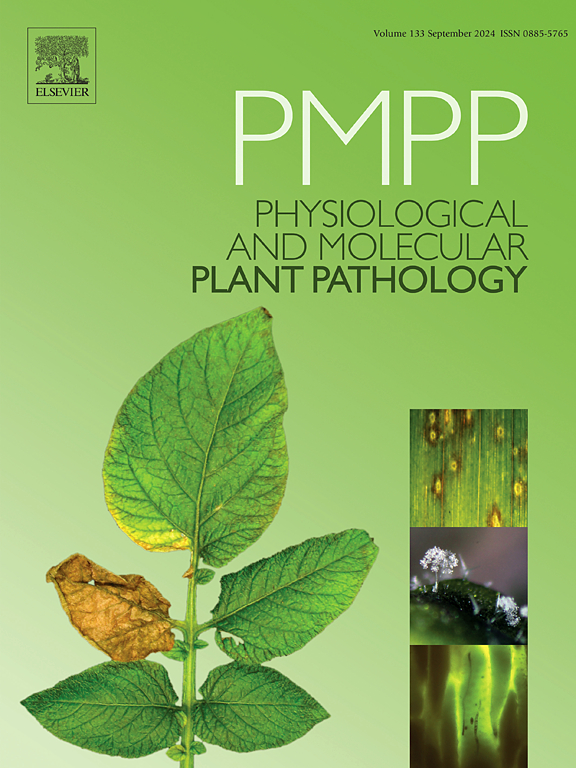Culture filtrates derived from endophytes Epicoccum spp. confer resistance against tobacco mosaic virus in Nicotiana benthamiana
IF 2.8
3区 农林科学
Q2 PLANT SCIENCES
引用次数: 0
Abstract
Tobacco mosaic virus (TMV) is a plant viral disease significantly affecting the losses of many economically important crops, and no active viricide is currently available for agricultural use. Herein, the efficacy of culture filtrates derived from fungal endophytes Epicoccum layuense strain J4-3 and E. nigrum strain 38L1, respectively isolated from symptomless stem of wheat and leaf of maize, was evaluated in reducing TMV infection in Nicotiana benthamiana. In doing so, dual foliar treatment was carried out 24 h before TMV inoculation under greenhouse conditions. Tracking the spread of green fluorescence protein-tagged TMV (TMV-GFP) in N. benthamiana plants revealed that the culture filtrates restricted the initial establishment of virus infection. Notably, quantitative reverse transcription polymerase chain reaction (qRT-PCR) results indicated a notable decrease in TMV accumulation in plants treated with endophyte's filtrates compared to the untreated controls. Additionally, using liquid chromatography-mass spectrometry (LC-MS), we identified a total of 8366 metabolites, including 569 differential metabolites based on variable importance in projection (VIP) > 1 and P < 0.05. Interestingly, previously reported metabolites with anti-TMV activity namely 13-Docosenamide, Chondroitin sulfate, and Melatonin were identified in culture filtrates of the strains J4-3 and 38L1. This is the first study depicting culture filtrates derived from fungal endophytes Epicoccum spp. to extenuate TMV virulence in N. benthamiana.
内生菌表皮芽孢杆菌培养滤液对烟草花叶病毒具有抗性
烟草花叶病毒(TMV)是一种严重影响许多重要经济作物损失的植物病毒性疾病,目前没有有效的杀菌剂可用于农业。本研究分别从小麦无症状茎和玉米叶片中分离出内生真菌表皮菌J4-3和内生真菌E. nigrum菌株38L1培养滤液,评价其降低本烟(Nicotiana benthamiana) TMV感染的效果。在温室条件下,接种TMV前24 h进行双叶面处理。追踪绿色荧光蛋白标记的TMV (TMV- gfp)在benthamiana植物中的传播,发现培养滤液限制了病毒感染的初始建立。值得注意的是,定量反转录聚合酶链反应(qRT-PCR)结果显示,与未处理的对照相比,内生菌滤液处理植株的TMV积累显著减少。此外,使用液相色谱-质谱(LC-MS),我们鉴定了总共8366种代谢物,其中包括569种基于投影变量重要性(VIP) >;1、P <;0.05. 有趣的是,先前报道的具有抗tmv活性的代谢物即13-Docosenamide,硫酸软骨素和褪黑素在菌株J4-3和38L1的培养滤液中被鉴定出来。这是第一个描述从真菌内生菌表皮菌衍生的培养滤液来减轻benthamiana的TMV毒力的研究。
本文章由计算机程序翻译,如有差异,请以英文原文为准。
求助全文
约1分钟内获得全文
求助全文
来源期刊
CiteScore
4.30
自引率
7.40%
发文量
130
审稿时长
38 days
期刊介绍:
Physiological and Molecular Plant Pathology provides an International forum for original research papers, reviews, and commentaries on all aspects of the molecular biology, biochemistry, physiology, histology and cytology, genetics and evolution of plant-microbe interactions.
Papers on all kinds of infective pathogen, including viruses, prokaryotes, fungi, and nematodes, as well as mutualistic organisms such as Rhizobium and mycorrhyzal fungi, are acceptable as long as they have a bearing on the interaction between pathogen and plant.

 求助内容:
求助内容: 应助结果提醒方式:
应助结果提醒方式:


